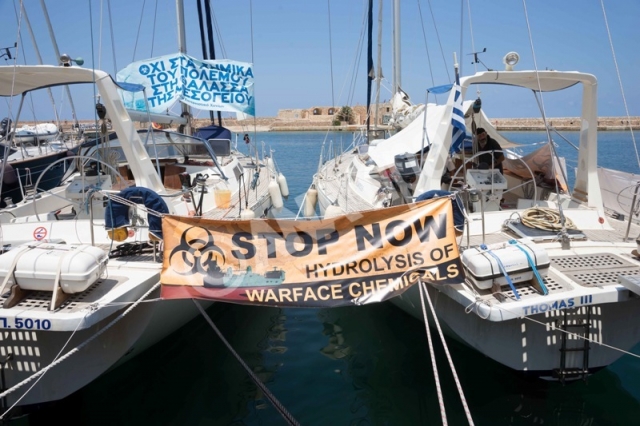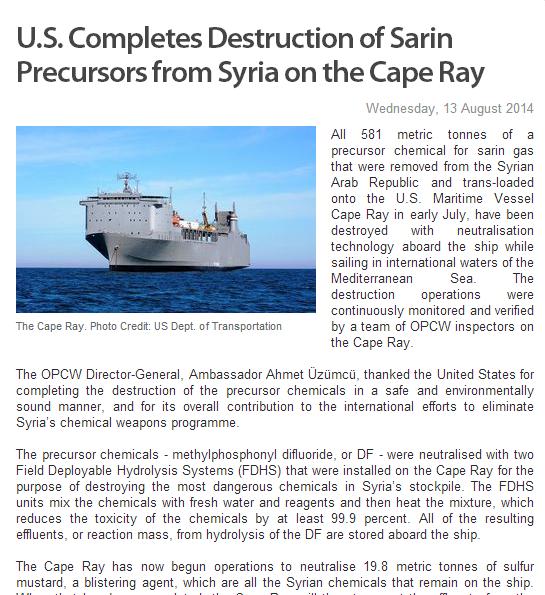Anastasia Balezdrova
The US government acclaimed the completion of the destruction operation of the Syrian chemical arsenal that took place in the Mediterranean Sea. The weapons had been delivered by the regime of Bashar al-Assad following the agreement that its representatives had reached with the USA and Russia last September.
The chemical weapons were destroyed in international waters in the Mediterranean basin on board the American warship USS Cape Ray that is specially equipped for this purpose. The most dangerous chemical agents were transferred to the ship and their destruction began in early July and took place through the method of hydrolysis.
The operation provoked a huge response in Greece and especially in Crete, as part of the arsenal was destroyed in the sea south of the island. The protests had a strong political orientation too, despite the expert opinion that theoretically the method does not pose any threat.

However, the question as to why a closed sea such as the Mediterranean was preferred for the completion of this operation has so far remained unanswered, especially as a representative of the Pentagon had confirmed to Agence France Presse that the destroyed chemical agents were used for the production of sarin and mustard gases to be used by the forces of the Syrian regime.
The fact that the Greek authorities had not provided enough information about the conduct of the operation and the possible consequences thereof gave rise to various rumours. One of them was that some of the agents intended for destruction were radioactive. GRReporter contacted the Greek Atomic Energy Commission, which categorically denied that there was a possibility of radioactive contamination. "There were no radioactive materials among the weapons and the concerns about such contamination are therefore unfounded," was the reply of the Commission.
According to the official release of the Organisation for the Prohibition of Chemical Weapons that supervised the operation, a total of 581 metric tons of precursors for the production of sarin were destroyed on board the US ship with the use of two Field Deployable Hydrolysis Systems (FDHS). "They mix the chemicals with fresh water and reagents and then heat the mixture, which reduces the toxicity of the chemicals by at least 99.9 percent. All of the resulting effluents, or reaction mass, from hydrolysis are stored aboard the ship.

The Cape Ray has now begun operations to neutralize 19.8 metric tons of sulfur mustard, which are all the Syrian chemicals on board the ship. When the procedures are completed the Cape Ray will then transport the effluents for disposal at land-based facilities in Finland and Germany," reads the message of the organisation.
Despite the satisfaction expressed at the destruction of the Syrian chemical arsenal, Washington said it would continue to monitor whether Damascus complies with international law. "The United States will watch to ensure that Syria will keep its promise to destroy the other bases for the production of chemical weapons," said Barack Obama.
The destruction operation of the arsenal in the Mediterranean Sea was completed exactly a year after the international community was shocked by the attack with chemical weapons by the regime of Bashar al-Assad against civilians in Syria. It killed over 1,000 people and many of the victims were children.